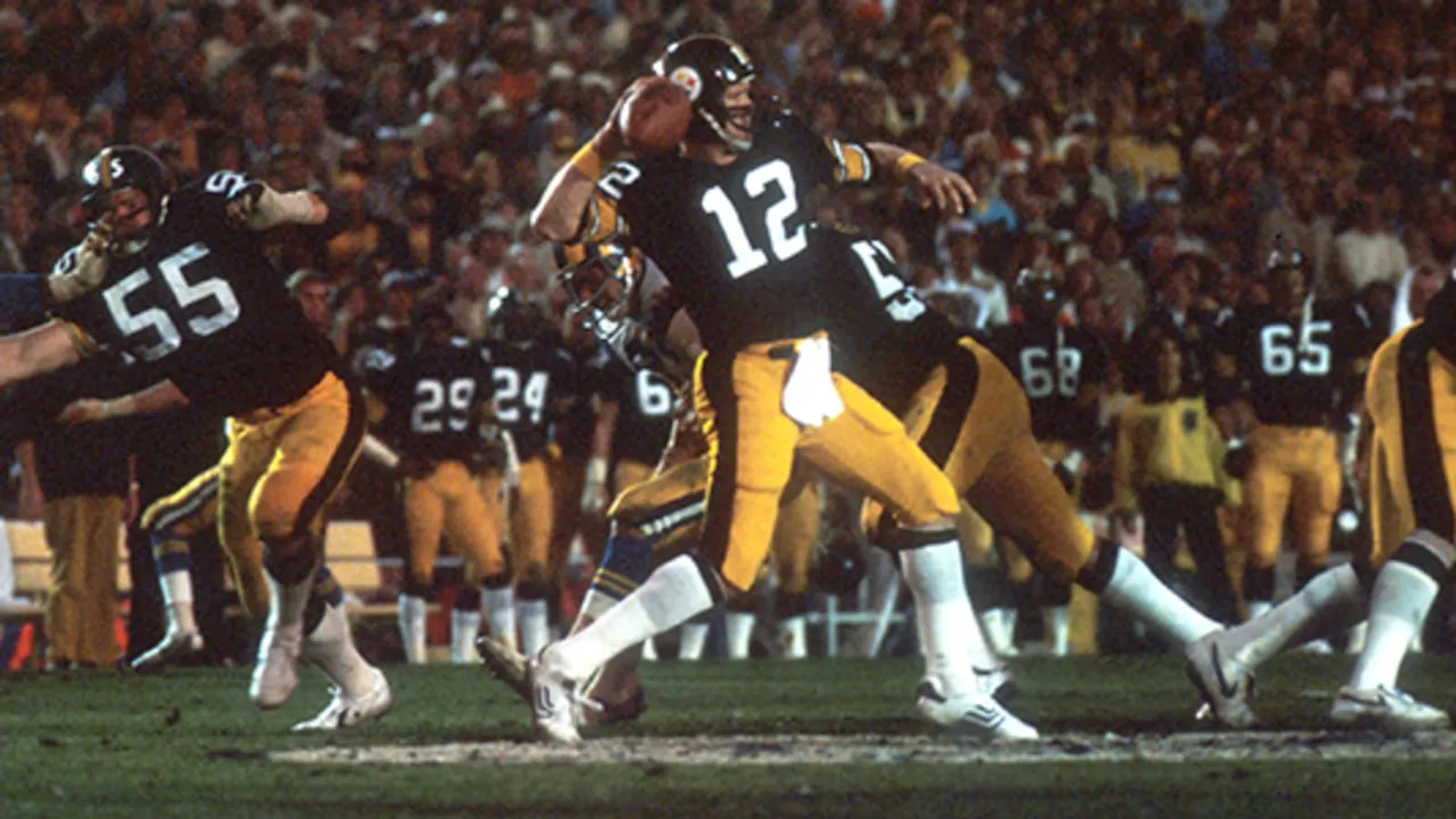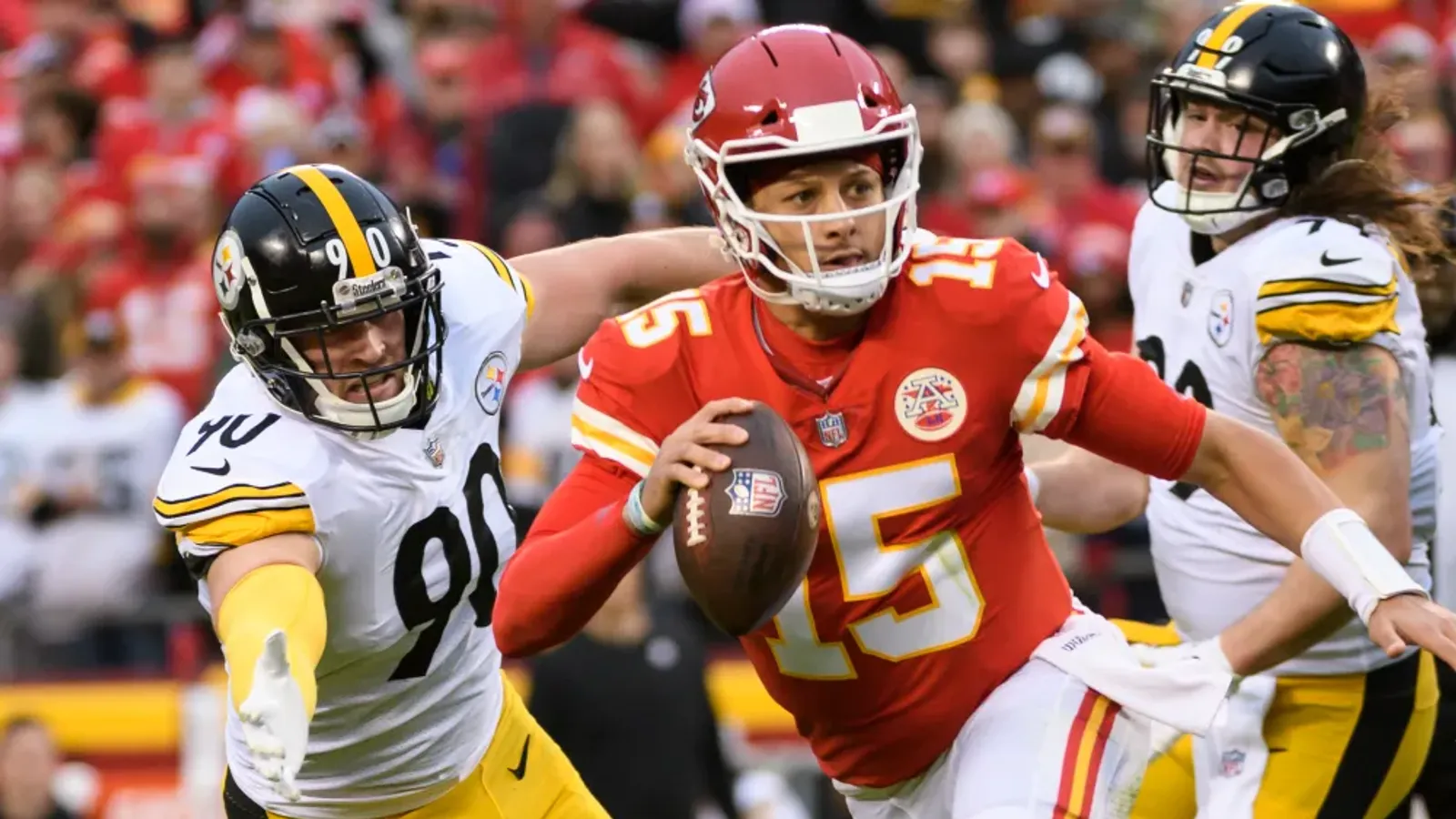The Pittsburgh Steelers were blessed when they selected Terry Bradshaw from Louisiana Tech with their first pick in the 1970 NFL Draft. Bradshaw went on to lead the Steelers to four Super Bowl championships, was a two-time Super Bowl MVP and a Hall of Famer.
 Steve Luciano / Associated Press
Steve Luciano / Associated Press“It was no faint of heart there, boy. It was a different football game completely. Not to say that these guys wouldn’t be outstanding. If Mahomes played for Pittsburgh, his numbers wouldn’t be any different. Cause you know when you average 19 passes a game, they’re not going to be different. They do 19 passes in the first two series now.” Mahomes just won his third Super Bowl at the young age of 28 years old. He’s now been to four Super Bowls and has only lost one. With his incredible talent and impressive accolades so early in his career, he’s making a serious run to challenge the legendary status of Tom Brady as the greatest quarterback of all time.
Mahomes just won his third Super Bowl at the young age of 28 years old. He’s now been to four Super Bowls and has only lost one. With his incredible talent and impressive accolades so early in his career, he’s making a serious run to challenge the legendary status of Tom Brady as the greatest quarterback of all time.
 It’s a fascinating comparison, considering Brady’s seven Super Bowl wins. Bradshaw, who won four Super Bowls himself, found the debate quite intriguing. However, Bradshaw doesn’t believe it’s really possible to compare himself to Mahomes because he played in such a different era.
It’s a fascinating comparison, considering Brady’s seven Super Bowl wins. Bradshaw, who won four Super Bowls himself, found the debate quite intriguing. However, Bradshaw doesn’t believe it’s really possible to compare himself to Mahomes because he played in such a different era.
“Just a different era, sometimes I say to my wife, Tammy. ‘You know, I wish I had played in this era so that I could have proven that I’m not a 52% completion guy.’ I’m much higher than I would be with the offenses that they run. Then everybody would say, ‘Oh man, he was so good.’ Then I say, ‘Woah, woah, I am okay where I am.'”
Over his illustrious 14-season career in Pittsburgh, Bradshaw left an indelible mark on the game. While his completion percentage might not have dazzled statisticians at just 51.9%, his impact went far beyond mere numbers. With 212 touchdowns and 210 interceptions, Bradshaw showcased both his daring spirit and his resilience in the face of adversity. However, if you just looked at his stats, you wouldn’t be very impressed.
But it wasn’t just about the stats for Bradshaw. His legacy is defined by his ability to rise to the occasion when it mattered most. Leading an impressive 15 comebacks and orchestrating 23 game-winning drives, Bradshaw embodied the essence of a true leader. He didn’t just play the game; he shaped its narrative with his grit, determination, and unwavering passion for victory.
In the realm of current football analysis, Bradshaw’s stats may not immediately leap off the page, but diving deeper reveals a nuanced truth: the game has undergone a metamorphosis since his gridiron glory days of the ’70s. Back then, the playbook was a different beast, rules were more lax, and the sheer physicality of the sport demanded a different breed of athlete.
In candid moments, Bradshaw has pondered his hypothetical place in today’s era of football, recognizing the hurdles while harboring a secret yearning to showcase his talents in the modern arena to the modern day audience.
Picture him threading needles amidst today’s fortified pass protection, deciphering intricate offensive schemes, and embracing the aerial theatrics that define modern day quarterbacking. It’s a tantalizing daydream for the former Steelers’ signal caller. Yet, even as his statistics may fall short of fully encapsulating his gridiron prowess by today’s standards, Bradshaw’s legend endures, especially within the hearts of Steelers die-hards.
To them, his greatness transcends mere numbers, finding its purest expression in the gleam of four Lombardi Trophies proudly hoisted in Pittsburgh’s storied history. In those climactic moments of gridiron glory, Bradshaw’s enduring legacy shines bright, untethered by the constraints of era-specific metrics or superficial comparisons.
News
🚨 Christie Sides Just Told The SHOCKING Truth About Indiana Losing To The Chicago Sky ‼️
🚨 Christie Sides Just Told The SHOCKING Truth About Indiana Losing To The Chicago Sky ‼️ Play video: . . . Indiana Fever Coach Christie Sides is…
‘I’M A DOG!’ 😤 – Angel Reese on career-high night in win vs. Caitlin Clark & Fever 🔥
‘I’M A DOG!’ 😤 – Angel Reese on career-high night in win vs. Caitlin Clark & Fever 🔥 Play video: . . . Angel Reese leads…
Angel Reese REFLECTS on NaLyssa Smith’s TOO SHORT celly in the Sky’s VICTORY over the Fever
Angel Reese REFLECTS on NaLyssa Smith’s TOO SHORT celly in the Sky’s VICTORY over the Fever Play video: . . . Angel Reese calls out NaLyssa…
Angel Reese’s perfect line after outdueling Caitlin Clark in dramatic 88-87 win
Angel Reese’s perfect line after outdueling Caitlin Clark in dramatic 88-87 win Angel Reese vs. Caitlin Clark was an epic rivalry in college basketball. It seems to…
Aces guard Kate Martin shares her support for Caitlin Clark before Sunday’s match on facing Angel Reese
Aces guard Kate Martin shares her support for Caitlin Clark before Sunday’s match on facing Angel Reese Play video: . . . Aces rookie Kate Martin prepares…
Kate Martin describes what it was like playing against Ex Iowa teammate Caitlin Clark
Kate Martin describes what it was like playing against Ex Iowa teammate Caitlin Clark Play video: . . . Kate Martin Used One Word to Describe…
End of content
No more pages to load







